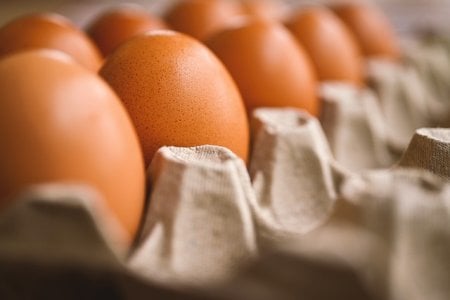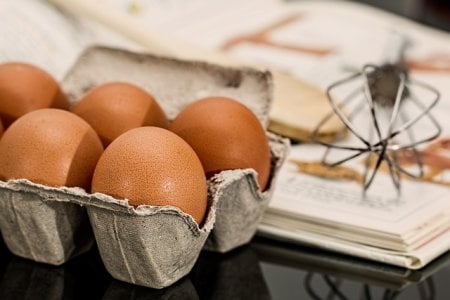Concerns over Rising Egg Prices as Caged Eggs Phased Out
There are growing concerns among consumers that egg prices may experience a significant surge if the plan to phase out caged eggs is expedited.
Australian shoppers have been cautioned about the possibility of paying as much as $15 for a dozen eggs due to the controversial decision to eliminate caged eggs from supermarket shelves.
Earlier, Woolworths announced they have already taken the initiative to discontinue their brand of caged eggs and aim to remove all caged eggs from their stores by 2025.

This move towards eliminating caged eggs has also raised concerns about potential shortages in egg supply.
Industry insiders have warned that consumers may have to pay more for eggs due to the privilege of having free-range eggs on their plates.
Reporter Tamara Bowe from Sunrise said, ‘We are being warned that we could pay more for the privilege of having them on your plate with industry insiders warning that yes, a dozen could soon set you back $15, which is just unheard of, especially with the rising cost of living the way it is at the moment.’
Originally, the phasing out of caged eggs was scheduled for 2046, but the government is considering implementing these changes a decade earlier.
Unfortunately, this acceleration in the timeline could pose challenges for farmers.
They would face significant costs when transitioning their farms to free-range egg production.
Bowe added, ‘It could cost millions of dollars, not to mention they may need to buy up extra land. And, of course, that cost will get passed on to us, the consumers at the shop.’

Presently, caged eggs account for 33 per cent of all supermarket sales. This demonstrates the prevalence of such eggs in the market.
However, as the phase-out progresses, consumers may experience a shift towards free-range eggs, despite the potential increase in prices.
Some individuals, like journalist Susie O'Brien, are willing to pay the premium for free-range eggs, citing ethical considerations and a desire for animals to lead happy lives.
She shared, ‘I always buy free-range eggs. I do usually $8 a carton, sometimes that’s twice as much as the cage ones. It’s worth it. I already pay more for free-range chicken because I eat chickens, but I actually want them while they are alive to have a happy life. I think people are prepared to pay more.’
However, others, including Sunrise host Nat Barr, express concerns about the affordability of organic or free-range options.
‘It’s really, really expensive to buy organic or free-range—a lot of people would like to, but a lot of people won’t be able to afford that,’ she pointed out.
Woolworths reaffirmed its commitment to removing all caged eggs from its stores over the next decade. Since 2015, their own brand of egg cartons has been 100 per cent cage-free.
‘We announced our plans to transition our entire egg range to cage-free back in 2013, and we’re working closely with our suppliers to gradually phase out caged eggs from all the brands we sell by 2025. We know many retailers and hospitality operators are moving in a similar direction,’ a Woolworths spokesperson shared.
Woolworths recognises that such a transition requires time and has collaborated with suppliers to ensure they have sufficient time to adjust their production methods.
The reduction in egg supply over the past 18 months, attributed to various factors including weather conditions and input costs, has affected the market both in retail and hospitality sectors.
Woolworths currently offers cage-free (barn-laid) eggs at an entry price of $4.60 per dozen, while caged eggs are priced at $4.50 per dozen.
Our members here at SDC have paid attention to the concerns about the cost that shifting to cage-free eggs entails.. They have shared comments, expressing their thoughts and opinions on the matter.
Member @prendyc said, ‘Good about time, so cruel to chooks’.
Another member, @Colette 3799 , shared, ‘Well, it’s about time! I only buy the chickens on pasture eggs, even with cage-free, the chickens are still crammed in too tight and don’t get outdoor time.’
A third member, @Jan Purcell , stated, ‘Good, I wish all shops would stop selling caged eggs, do you know how those poor hens suffer such cruel conditions, they can't move around at all, how would we like to be caged up like those poor hens, they should be allowed to roam free, all caged hen farms, should be shut down, and named and shamed and given a very heavy fine.’

The issue raises questions about ethical concerns, animal welfare, affordability, and the balance between industry sustainability and consumer accessibility.
We encourage you to reflect on these aspects and share your thoughts with others. It is through open dialogue and discussions that we can better understand the complexities of these decisions and work towards a future that aligns with our values and priorities.
We’d love to hear your opinions on this matter: what are your thoughts on the potential rise in egg prices due to the phase-out of caged eggs?
Australian shoppers have been cautioned about the possibility of paying as much as $15 for a dozen eggs due to the controversial decision to eliminate caged eggs from supermarket shelves.
Earlier, Woolworths announced they have already taken the initiative to discontinue their brand of caged eggs and aim to remove all caged eggs from their stores by 2025.

The proposed plan to phase out caged eggs raised concerns about potential financial implications. Image by Pixabay
This move towards eliminating caged eggs has also raised concerns about potential shortages in egg supply.
Industry insiders have warned that consumers may have to pay more for eggs due to the privilege of having free-range eggs on their plates.
Reporter Tamara Bowe from Sunrise said, ‘We are being warned that we could pay more for the privilege of having them on your plate with industry insiders warning that yes, a dozen could soon set you back $15, which is just unheard of, especially with the rising cost of living the way it is at the moment.’
Originally, the phasing out of caged eggs was scheduled for 2046, but the government is considering implementing these changes a decade earlier.
Unfortunately, this acceleration in the timeline could pose challenges for farmers.
They would face significant costs when transitioning their farms to free-range egg production.
Bowe added, ‘It could cost millions of dollars, not to mention they may need to buy up extra land. And, of course, that cost will get passed on to us, the consumers at the shop.’

Hens raised in conventional cage systems typically have limited space, with each hen allocated an average floor space equivalent to less than a standard sheet of letter-sized paper. Image by Pixabay
Presently, caged eggs account for 33 per cent of all supermarket sales. This demonstrates the prevalence of such eggs in the market.
However, as the phase-out progresses, consumers may experience a shift towards free-range eggs, despite the potential increase in prices.
Some individuals, like journalist Susie O'Brien, are willing to pay the premium for free-range eggs, citing ethical considerations and a desire for animals to lead happy lives.
She shared, ‘I always buy free-range eggs. I do usually $8 a carton, sometimes that’s twice as much as the cage ones. It’s worth it. I already pay more for free-range chicken because I eat chickens, but I actually want them while they are alive to have a happy life. I think people are prepared to pay more.’
However, others, including Sunrise host Nat Barr, express concerns about the affordability of organic or free-range options.
‘It’s really, really expensive to buy organic or free-range—a lot of people would like to, but a lot of people won’t be able to afford that,’ she pointed out.
Woolworths reaffirmed its commitment to removing all caged eggs from its stores over the next decade. Since 2015, their own brand of egg cartons has been 100 per cent cage-free.
‘We announced our plans to transition our entire egg range to cage-free back in 2013, and we’re working closely with our suppliers to gradually phase out caged eggs from all the brands we sell by 2025. We know many retailers and hospitality operators are moving in a similar direction,’ a Woolworths spokesperson shared.
Woolworths recognises that such a transition requires time and has collaborated with suppliers to ensure they have sufficient time to adjust their production methods.
The reduction in egg supply over the past 18 months, attributed to various factors including weather conditions and input costs, has affected the market both in retail and hospitality sectors.
Woolworths currently offers cage-free (barn-laid) eggs at an entry price of $4.60 per dozen, while caged eggs are priced at $4.50 per dozen.
Our members here at SDC have paid attention to the concerns about the cost that shifting to cage-free eggs entails.. They have shared comments, expressing their thoughts and opinions on the matter.
Member @prendyc said, ‘Good about time, so cruel to chooks’.
Another member, @Colette 3799 , shared, ‘Well, it’s about time! I only buy the chickens on pasture eggs, even with cage-free, the chickens are still crammed in too tight and don’t get outdoor time.’
A third member, @Jan Purcell , stated, ‘Good, I wish all shops would stop selling caged eggs, do you know how those poor hens suffer such cruel conditions, they can't move around at all, how would we like to be caged up like those poor hens, they should be allowed to roam free, all caged hen farms, should be shut down, and named and shamed and given a very heavy fine.’
Key Takeaways
- A controversial plan to eliminate caged eggs may lead to higher egg prices.
- Shoppers are warned that a dozen eggs could cost up to $15.
- Woolworths is already discontinuing its own brand of caged eggs, aiming for complete removal by 2025.
- Potential shortages are predicted due to the caged egg ban.
- Transitioning to free-range egg production may also result in significant costs for farmers, which could be passed on to consumers.
- The current market indicates caged eggs account for 33 per cent of supermarket sales.
The issue raises questions about ethical concerns, animal welfare, affordability, and the balance between industry sustainability and consumer accessibility.
We encourage you to reflect on these aspects and share your thoughts with others. It is through open dialogue and discussions that we can better understand the complexities of these decisions and work towards a future that aligns with our values and priorities.
We’d love to hear your opinions on this matter: what are your thoughts on the potential rise in egg prices due to the phase-out of caged eggs?
Last edited:








